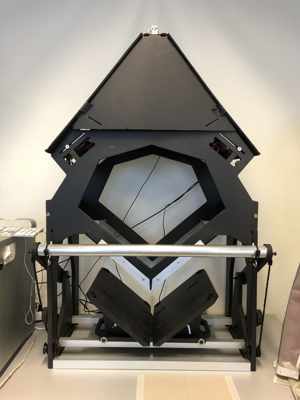User:Simon/Trim4/Text Laundrette: Difference between revisions
| Line 37: | Line 37: | ||
File:IMG 20200203 175656.jpg| Explaining the steps of the workshop | File:IMG 20200203 175656.jpg| Explaining the steps of the workshop | ||
TL 02.jpeg|poster | TL 02.jpeg|poster | ||
TL 05.jpeg|the physical bootleg library | |||
File:IMG 20200203 183541.jpg| Using the bookscanner | |||
TL 06.jpeg|hand-watermarking section | |||
TL 03.jpeg|watermarked annotations from artemis, verso | TL 03.jpeg|watermarked annotations from artemis, verso | ||
TL 04.jpeg|watermarked annotations from artemis, recto | TL 04.jpeg|watermarked annotations from artemis, recto | ||
TL 07.jpeg|watermarks on cybertext | TL 07.jpeg|watermarks on cybertext | ||
TL 09.jpeg|watermarks on cybertext, verso | TL 09.jpeg|watermarks on cybertext, verso | ||
Revision as of 19:16, 19 June 2020
Text Laundrette
Text Laundrette is a workshop in which we use a home-made, DIY book scanner, and open-source software to scan, process, and add digital features to printed texts brought by the participants to the workshop. These are included in the “bootleg library”, a shadow library accessible over a local network.
Abstract of workshop
Text Launderette
A workshop organised by Simon Browne and Pedro Sá Couto, for the py.rate.chnic sessions. First held at WdKA in the Publication Station, February 2020.
Description
Text Laundrette is a print party workshop.
We will use a home-made, DIY book scanner, and open-source software to scan, process, and add digital features to printed texts brought by the participants to the workshop. Ultimately, we will include them in the "bootleg library", a shadow library accessible over a local network.
Shadow libraries operate outside of legal copyright frameworks, in response to decreased open access to knowledge. This workshop aims to extend our research on libraries, their sociability, and methods by which we can add provenance to texts included in public or private, legal or extra-legal collections.
At WdKA Publication Station
The workshop follows a workflow of the following steps:
- Choosing texts
- Watermarking
- Scanning
- Processing
- Uploading
- Rinse and repeat (return to step 1)
First workshop 03.02.20
The workshop ran over 2 hours with invited guests from the academy. It was an ambitious workflow, but we managed to run through several iterations of watermarking, scanning, processing and uploading. The realisation of how much work is involved in digitising and processing texts was certainly a take-home for participants. An interesting moment occurred when uploading - who was the author of the altered text?
Some photos here:
















